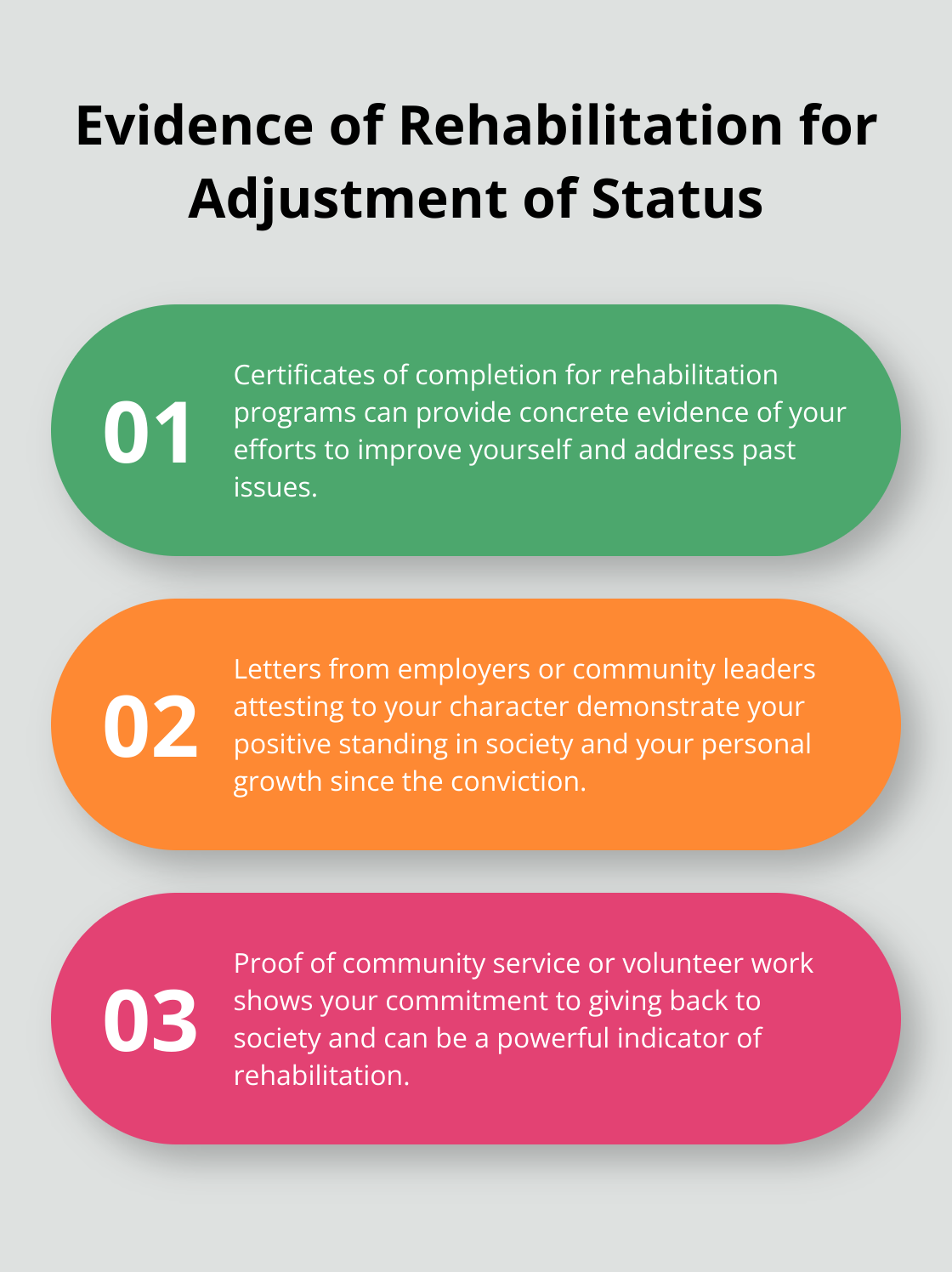
How to Handle Adjustment of Status with a Criminal Record?
Navigating the adjustment of status process with a criminal record can be daunting. At Law Offices of Jeffrey A. Thompson, we understand the complexities and challenges this situation presents.
Our goal is to provide clear guidance on how to handle an adjustment of status with a criminal record. We’ll explore the impact of criminal histories on applications and offer practical steps to strengthen your case.
What Is Adjustment of Status and How Does a Criminal Record Affect It?
Understanding Adjustment of Status
Adjustment of Status allows eligible individuals to apply for lawful permanent resident status (green card) without leaving the United States. This process involves submitting Form I-485 to U.S. Citizenship and Immigration Services (USCIS). The form requires detailed information about your background, including any criminal history.
Types of Criminal Records
Not all criminal records impact immigration law equally. Minor traffic violations generally don’t affect your application. However, more serious offenses can create significant obstacles. Past immigration violations or criminal convictions may render an applicant inadmissible.
Crimes that can severely impact your application include:

- Aggravated felonies
- Crimes involving moral turpitude
- Drug-related offenses
Even if you weren’t convicted, arrests can raise red flags. USCIS has access to FBI databases and can view your entire criminal history (including dismissed charges).
The Importance of Full Disclosure
Full disclosure is paramount in the Adjustment of Status process. Lying on your application is a crime itself and can lead to automatic denial and potential deportation. USCIS considers false statements on immigration forms as crimes involving moral turpitude.
You must provide official documentation for any criminal incidents, including police reports and court records. If you can’t obtain these, a detailed personal statement explaining the situation may suffice.
Navigating the Process
Having a criminal record doesn’t automatically disqualify you from adjusting your status. Each case is unique, and there are often ways to overcome past mistakes. However, this process requires expert guidance.
The next chapter will explore the specific impacts of criminal records on Adjustment of Status and discuss available waivers for certain convictions.
How Criminal Records Impact Adjustment of Status
Inadmissibility Grounds
Criminal records can significantly affect the Adjustment of Status process. Certain crimes can make an applicant inadmissible, effectively barring them from obtaining lawful permanent resident status. These include:
- Aggravated felonies: This category encompasses serious crimes like murder, rape, drug trafficking, and certain theft or violent crimes.
- Crimes involving moral turpitude (CIMT): A noncitizen is deportable for two or more convictions of crimes involving moral turpitude that occur anytime after admission to the U.S. on any visa.
- Drug-related offenses: Even minor drug convictions can lead to inadmissibility, with limited exceptions for single offenses involving small amounts of marijuana (30 grams or less).
- Multiple criminal convictions: Two or more convictions, regardless of the type, can result in inadmissibility if the aggregate sentences total five years or more.
Waivers and Exceptions
In some cases, waivers may overcome inadmissibility grounds. The I-601 waiver is a common option for certain criminal convictions. However, these waivers are discretionary and require the applicant to demonstrate that denial would result in extreme hardship to a qualifying U.S. citizen or permanent resident relative.
It’s important to note that not all crimes qualify for waivers. Aggravated felonies and most drug offenses (with the exception mentioned above) generally cannot be overcome through waivers.
USCIS Evaluation Process
U.S. Citizenship and Immigration Services (USCIS) thoroughly evaluates criminal records during the Adjustment of Status process. They consider factors such as:

- The nature and severity of the offense
- The circumstances surrounding the crime
- The length of time since the offense occurred
- Evidence of rehabilitation
USCIS also conducts extensive background checks, including FBI fingerprint scans and name checks. The background and security checks include collecting fingerprints and requesting a “name check” from the Federal Bureau of Investigations (FBI).
The Importance of a Comprehensive Application
Presenting a comprehensive application package is essential. This should include all required documentation, evidence of rehabilitation, and a detailed explanation of past offenses. While criminal records can complicate the Adjustment of Status process, they don’t always result in automatic denial.
The next chapter will outline specific steps applicants with criminal records can take to strengthen their Adjustment of Status application and increase their chances of success.
Navigating Adjustment of Status with a Criminal Record
Obtain and Review Your Criminal Record
The first step requires you to get a comprehensive view of your criminal history. Request your records from all relevant jurisdictions where you’ve lived or traveled. This includes state and federal records, as well as records from any foreign countries where you may have had legal issues.
After you receive your records, review them carefully. Look for any discrepancies or errors that need correction. Understanding the full extent of your criminal history is vital for accurate disclosure on your application.
Seek Expert Legal Guidance
Consulting with an experienced immigration attorney is not just helpful-it’s a necessity. Immigration laws are complex and constantly changing. An attorney who specializes in immigration law can provide invaluable insights into your specific case.
Gather Evidence of Rehabilitation
Demonstrating rehabilitation is key to overcoming past criminal issues. Collect evidence that shows how you’ve changed since your conviction. This might include:

- Certificates of completion for rehabilitation programs
- Letters from employers or community leaders attesting to your character
- Proof of community service or volunteer work
- Documentation of educational achievements since the conviction
Those in detention are more likely to have interactions with the criminal system that further lowers their chances of success when seeking relief.
Prepare a Comprehensive Application Package
Your application package should be thorough and well-organized. Include all required forms, supporting documents, and additional evidence that strengthens your case. Be meticulous in filling out forms-even small errors can lead to delays or denials.
Write a detailed personal statement explaining the circumstances of your criminal record and how you’ve changed since then. This statement should be honest, show remorse, and highlight your positive contributions to society.
USCIS officers review thousands of applications. A well-prepared, comprehensive package can make a significant difference in how your case is perceived and processed.
Address Potential Challenges
Anticipate potential challenges that may arise due to your criminal record. Prepare responses to questions about your past offenses and be ready to explain how you’ve reformed. If waivers are available for your specific situation, gather all necessary documentation to support your waiver application.
When dealing with Adjustment of Status, it’s crucial to obtain certified court dispositions for all arrests and convictions. Be prepared to explain the circumstances and demonstrate how you’ve changed since the incidents occurred.
Final Thoughts
Adjustment of status with a criminal record presents unique challenges, but it’s not impossible. Full disclosure and transparency about your past demonstrate integrity and can work in your favor. Obtaining and reviewing your criminal records ensures you have an accurate understanding of your situation.
Evidence of rehabilitation plays a vital role in strengthening your case. This includes certificates from completed programs, character references, and proof of community involvement. A comprehensive application package (with all required forms and supporting documents) can significantly impact how USCIS perceives your case.
The complexities of immigration law make professional legal assistance invaluable. At Law Offices of Jeffrey A. Thompson, we specialize in handling complex immigration cases, including adjustment of status with criminal records. Our experienced team provides expert guidance to navigate this challenging process effectively.


